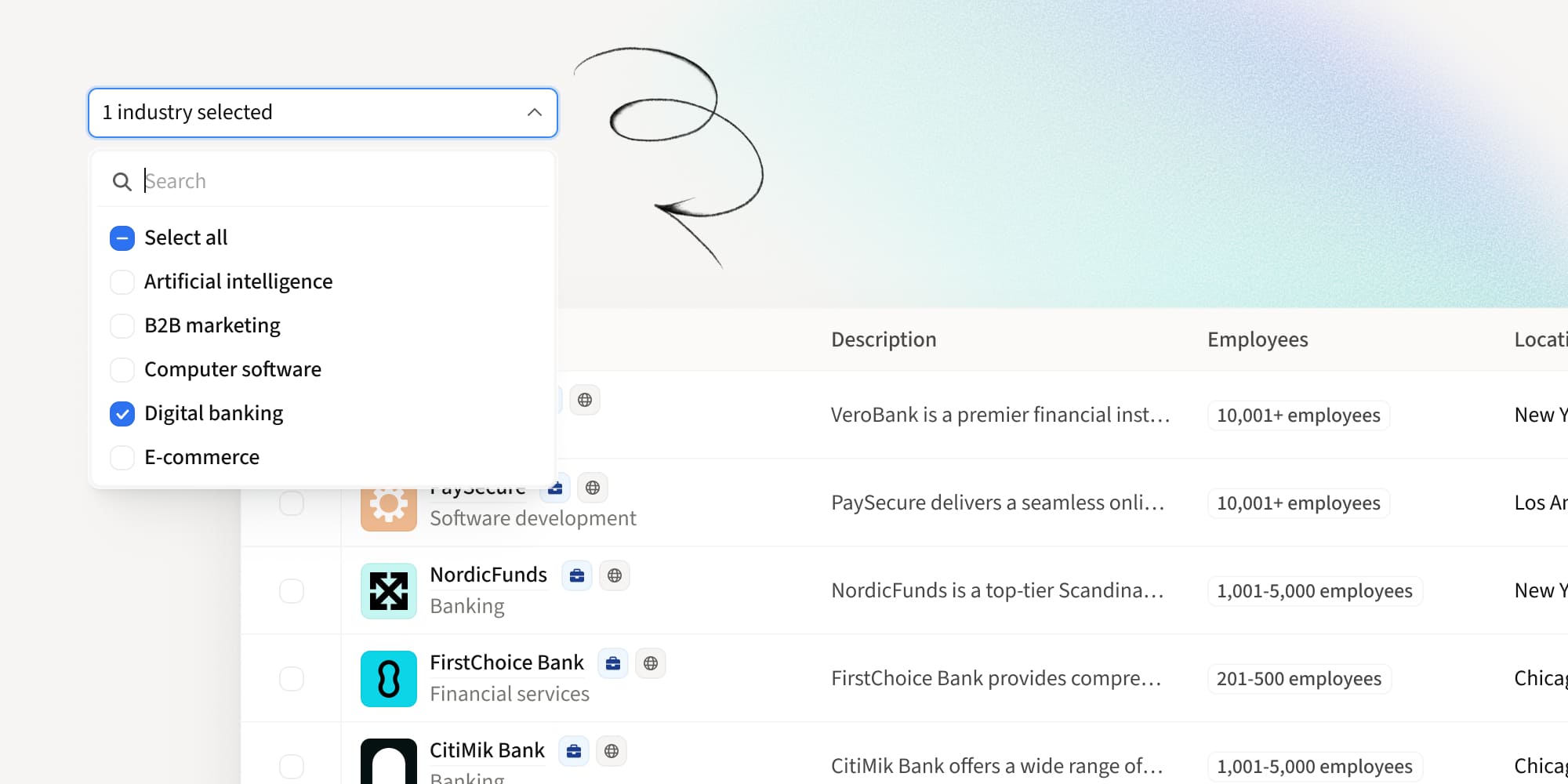Boosting B2B sales productivity with AI part 4: workflow automation
•
June 30, 2024
.jpg)
This blog is part of the transcript for our webinar: "4 Ways to Unlock B2B Seller Productivity with Amplemarket AI". You can view to full webinar here.
In part 1 of this webinar transcript, we discussed the evolution of AI and machine learning models over the past few years to today.
In part 2, we explored some of the use cases for these models in B2B sales, specifically how Amplemarket’s AI tools can boost productivity in prospecting and pipeline generation.
In part 3, we discussed how Amplemarket’s AI Copywriter, lets you leverage cutting-edge generative AI to connect with prospects faster.
In this part, we talk about the power of automation and how AI algorithms can support the day-to-day workload of sales reps, save time, and reduce errors in repetitive tasks.
What happens after those first outbound messages? How do you manage your replies and workflow for follow-ups?
How can you help you team handle objections across large volumes of leads and know which to prioritize next?
Enter workflow automation—a game-changer that streamlines these tasks, allowing sales professionals to focus on what they do best: closing deals.
Let's explore what exactly workflow automation is, why it’s crucial, and how you can leverage it to revolutionize your sales process.
What is workflow automation?
Workflow automation involves the use of technology to automate repeatable business tasks, minimizing manual intervention.
This not only saves time but also reduces the likelihood of human error.
By automating workflows, businesses can ensure that processes run smoothly and efficiently from start to finish.
What is automation?
Automation is the general technique of making an apparatus, a process, or a system operate automatically.
It’s built on the simple premise of setting up a task to be executed automatically based on predefined triggers.
For instance: "When a new lead signs up, send a welcome email."
This principle can be applied to numerous business processes to improve efficiency and consistency - but of course, we're interested in how it applies to your sales.
What is a workflow?
A workflow is a series of steps that need to be followed to complete a task or process.
Think of it as a detailed map outlining every action required to achieve a specific outcome.
For instance, the workflow for onboarding a new client might include steps like sending a welcome email, setting up a meeting, creating a project plan, and updating the CRM.
An automated workflow means that an entire process of actions works on autopilot, removing the need for manual monitoring or interference.
Why invest in workflow automation?
Investing in workflow automation can significantly enhance productivity and operational efficiency.
Here are some of the benefits you should consider:
1. Saving time and increasing productivity
Automation takes over repetitive tasks, freeing up your time to focus on strategic activities that require a human touch. For example, automating email follow-ups can save hours each week, allowing sales reps to concentrate on more personal, face-to-face engagement with potential clients.
2. Reducing errors and improving accuracy
Tasks like manual data entry isareprone to errors, which can lead to costly mistakes. Workflow automation ensures that efforts are consistently accurate by eliminating the need for manual activity. For sellers, this means more reliable data and less risk of leads slipping out the funnel!
3. Scaling your business efficiently
Automation enables businesses to handle an increased volume of tasks without additional resources. This scalability is crucial for growing businesses looking to expand their operations without significantly increasing costs.
4. Enhancing customer experience
Automated workflows ensure that tasks are completed promptly and consistently to optimize customer experiences. For instance, automated follow-ups ensure that no lead is forgotten and that every prospect receives a relevant response.
Virtually any industry can benefit from workflow automation. Whether you’re in sales, marketing, finance, or customer support, automating repetitive tasks can lead to significant improvements in efficiency and productivity, whilst simultaneously delivering more consistent value to your target audience!
Who benefits from workflow automation?
Workflow automation can help everyone in your revenue team, including:
- Sales teams: Automate follow-ups, manage contacts, and schedule meetings.
- Marketing teams: Streamline campaigns, manage content, and track engagement.
- Customer support: Automate ticketing systems, respond to FAQs, and monitor customer satisfaction.
- Finance departments: Automate invoicing, expense tracking, and financial reporting.
Workflow automation ideas for sales
Let's explore five specific examples of how workflow automation can benefit sales teams:
Workflow automation idea 1: Prospect follow-up
Automate follow-up emails to ensure no lead is neglected, maintaining consistent engagement.
If possible, you want to be able to create automated responses to fit a wide range of scenarios, such as leads who are not interested, haven't replied to your emails, aren't the right person to ask, orare out of office.
Workflow automation idea 2: Scheduling meetings
Use scheduling software to automate the process of setting up meetings, reducing the back-and-forth communication.
Workflow automation idea 3: Sales pipeline management
Automatically update your CRM with deal statuses to keep your sales pipeline accurate, centralized, and up-to-date.
Workflow automation idea 4: Contact management
Capture and update customer interaction details in your CRM without manual entry, ensuring all information is current and accurate.
Workflow automation idea 5: Add to exclusion lists
Use AI sentiment analysis to identify negative responses and automatically route them to your exclusion lists so those leads don't get contacted again.
Benefits of workflow automation in business processes
Workflow automation provides numerous benefits to business processes, including:
- Increased efficiency: Automating repetitive tasks allows employees to focus on higher-value activities.
- Consistency: Ensures processes are completed the same way every time, reducing variability and errors.
- Cost savings: Reduces the need for manual labor, cutting down on labor costs.
- Better resource management: Frees up resources to be used more effectively elsewhere!
How to automate workflows and processes with Amplemarket
AI-powered automation has been at the heart of Amplemarket for some time. The technology underlying our workflows is composed of two parts:
1. Our AI classifies different actions
Firstly, we use machine learning to process every reply we get to a sequence for classification:
- Is this a positive reply?
- Is this a negative reply?
- Is this actually a hard no?
- Do we need to take action on those to make sure that we unsubscribe them?
- Or is this someone who is really interested? In this case, how do we make sure that these leads get the most attention from the sales reps so that we can nurture them to the next stage ASAP?
2. Outline the process you want to automate
With this classification complete, we can trigger the relevant workflow automation. That is, to say, “always handle this in a certain way”.
For example:
- Always move “hard nos” into the exclusion list so they're not contacted again
- Always pause the sequence for people who want to circle back later, trigger a sequence to be sent at a future dat
- Always ensure "interested" leads are flagged so the team follows-up quickly.
This automation takes eliminates a huge amounts of tedious manual work.
By streamlining your sales workflow, the automation ensures there are no forgotten tasks, that you don't leave hot leads waiting, and that circle-backs happen at the right time (instead of depending on the SDR's memory).
This helps you raise the bar for your whole team to operate in a more consistent manner, ensuring that your highest priority leads are always handled first.
Future-proof your sales operations with the ultimate end-to-end AI solution
Step into the future of sales with Amplemarket's AI - sign up for a demo to see how you can unlock your business's real potential!
Or click here to learn more about Amplemarket's workflow automation.
FAQs on AI workflow automation
What’s the difference between dynamic vs. static workflows?
Dynamic workflows adapt to changes and can be modified in real-time, while static workflows follow a fixed sequence of steps.
What’s the difference between a workflow engine vs. business rules engine?
A workflow engine automates the sequence of steps in a process, while a business rules engine automates decision-making based on predefined rules. Both can be used to enhance workflow automation.
What’s the difference between workflow automation vs. robotic process automation?
Workflow automation focuses on automating business processes, while robotic process automation (RPA) uses software robots to perform repetitive tasks. Both can improve efficiency but serve different purposes.
Subscribe to Amplemarket Blog
Sales tips, email resources, marketing content, and more.










